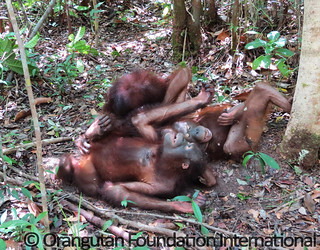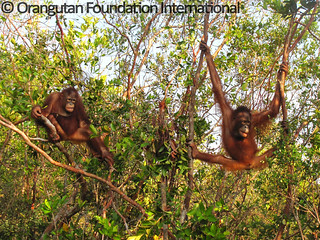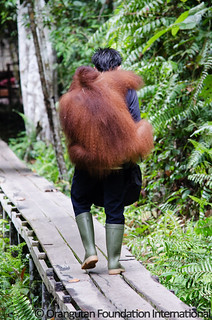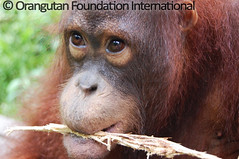Tags:
OCCQ Without a doubt, the most lively and boisterous age group of orphaned orangutans at the Orangutan Foundation International (OFI) Orangutan Care Center and Quarantine (OCCQ) are the juveniles. Between five and nine years of age, these juvenile orangutans are full of energy and curiosity.
Without a doubt, the most lively and boisterous age group of orphaned orangutans at the Orangutan Foundation International (OFI) Orangutan Care Center and Quarantine (OCCQ) are the juveniles. Between five and nine years of age, these juvenile orangutans are full of energy and curiosity.
From their initial arrival at the OCCQ, orphaned orangutans are lovingly cared for by OFI caregivers who fulfill the role of surrogate mother. As the orangutans grow, they become more independent and self-sufficient. They graduate from the Infant Playground into the OFI Learning Forest to spend more time in the trees. These juvenile orangutans receive love and support from the caregivers, but are given more independence when in the forest each day. For the juveniles, this is their opportunity to refine their forest skills – skills that are essential for their eventual return to the wild. Juvenile orangutans are still too young to live by themselves in the wild. Yet they are learning new skills every day and are well on the road to rehabilitation, one step closer to their return to the wild.
 Each day the juvenile orangutans are led out into the OFI Learning Forest to play and practice their forest skills. The forest is buzzing with boisterous red-heads climbing, somersaulting, playing, nest-building, and exploring their surroundings. Forest time is the favorite time of day and they know how to make the most of it! Some orangutans spend time building tree-top nests for relaxation. Others are in hot pursuit of a friend, swinging with vigor through the trees in a game of ‘follow the leader.’ Other youngsters are digging in the earth with a stick to find termites, a favorite snack. And some are off on their own, picking leaves and sampling the freshest forest delights.
Each day the juvenile orangutans are led out into the OFI Learning Forest to play and practice their forest skills. The forest is buzzing with boisterous red-heads climbing, somersaulting, playing, nest-building, and exploring their surroundings. Forest time is the favorite time of day and they know how to make the most of it! Some orangutans spend time building tree-top nests for relaxation. Others are in hot pursuit of a friend, swinging with vigor through the trees in a game of ‘follow the leader.’ Other youngsters are digging in the earth with a stick to find termites, a favorite snack. And some are off on their own, picking leaves and sampling the freshest forest delights.
With their developing wanderlust and sense of curiosity, juvenile orangutans are prone to wandering outside of the Learning Forest which is located in the 90 hectare (approximately 220 acres) area of the Orangutan Care Center. So each juvenile orangutan is accompanied into the forest by an OFI staff member who follows the juvenile throughout the day. Orangutans are given the freedom to explore but a caregiver is always present to coax them down from the trees if they stray too far. With their favorite caregivers watching from below, juveniles feel safe in testing their limits in the forest. They may be rambunctious with that signature adventurous spirit typical of juvenile orangutans, but if something startles or scares them, like a snapping branch or unexpected loud noise, they are quick to scramble down to the forest floor for a reassuring hug from their caregiver.
 As part of their rehabilitation, juvenile orangutans are encouraged to walk themselves into the forest next to their caregiver. The infants are carried into the forest each day, clinging to an arm or the back of their favorite human. But as the orangutans grow into juvenilehood and adolescence they become too big to be carried and are encouraged to walk. This is not to say that some still don’t try to hitch an easy ride with their caregiver to and from the forest. Yet for most of the juveniles, this is a mark of independence and they stride proudly into the forest. The juveniles climb strongly and, once in the forest for the most part, spend their time in the trees. As their confidence grows, most of the juveniles want to soak up as much time as possible in the forest canopy.
As part of their rehabilitation, juvenile orangutans are encouraged to walk themselves into the forest next to their caregiver. The infants are carried into the forest each day, clinging to an arm or the back of their favorite human. But as the orangutans grow into juvenilehood and adolescence they become too big to be carried and are encouraged to walk. This is not to say that some still don’t try to hitch an easy ride with their caregiver to and from the forest. Yet for most of the juveniles, this is a mark of independence and they stride proudly into the forest. The juveniles climb strongly and, once in the forest for the most part, spend their time in the trees. As their confidence grows, most of the juveniles want to soak up as much time as possible in the forest canopy.
At the end of each day, the juvenile orangutans are coaxed down from the trees to return to their sleeping enclosures. This can be a difficult endeavor as many of the juveniles do not want to leave the forest. Some will refuse to come down and others will play chase through the trees. However, caregivers almost always succeed in enticing the juvenile down. A tempting treat of fruit usually does the trick.
 Just like humans, orangutans age slowly. The males won’t reach maturity until their late teenage years. As they develop, their inherent solitary nature also grows. This development is bittersweet for the dedicated OFI caregivers, who have sometimes seen orangutans grow from infancy into adolescence. Like parents waving their children off to college, the surrogate mothers of OFI are present to guide these juvenile orangutans into maturity and lead them down the path towards freedom. It’s a hard job but also deeply rewarding. Click here to foster a juvenile orangutan, and your contribution will help feed and care for one of our hundreds of forest orphans.
Just like humans, orangutans age slowly. The males won’t reach maturity until their late teenage years. As they develop, their inherent solitary nature also grows. This development is bittersweet for the dedicated OFI caregivers, who have sometimes seen orangutans grow from infancy into adolescence. Like parents waving their children off to college, the surrogate mothers of OFI are present to guide these juvenile orangutans into maturity and lead them down the path towards freedom. It’s a hard job but also deeply rewarding. Click here to foster a juvenile orangutan, and your contribution will help feed and care for one of our hundreds of forest orphans.


